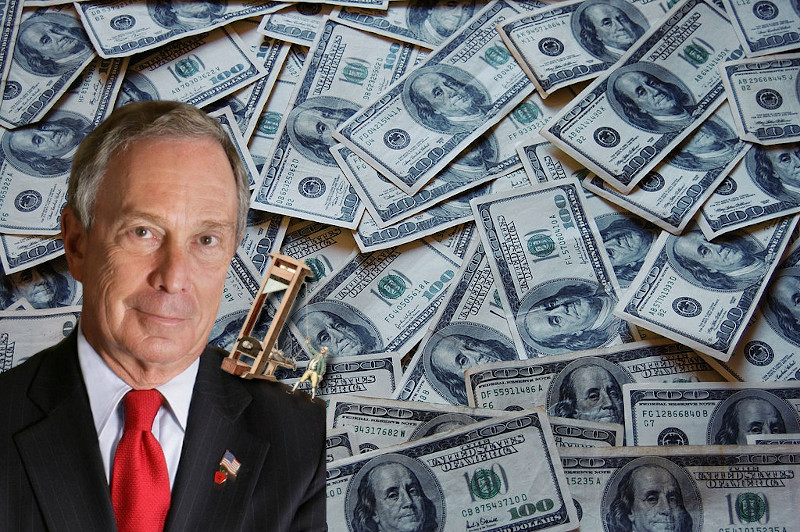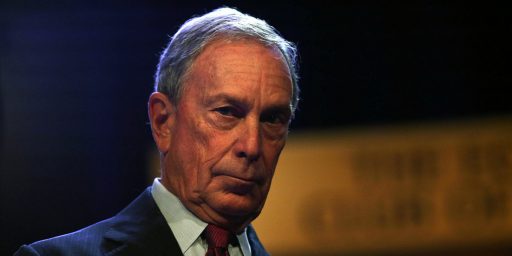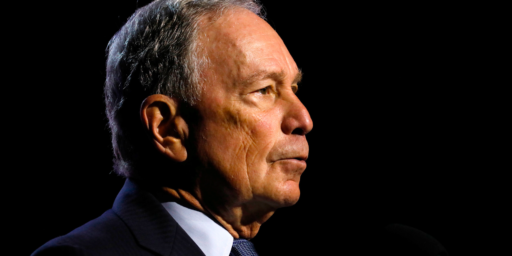Bloomberg’s Influence-Buying
Unprecedented spending since leaving City Hall has put him in a unique position.

In, “Bloomberg’s Billions: How the Candidate Built an Empire of Influence,” Alexander Burns and Nicholas Kulish of the NYT have investigated Mike Bloomberg’s enormous donations to political campaigns and causes since leaving city hall. They’ve combined with their graphics team to create an interactive page that’s rather challenging to navigate. But it’s nonetheless fascinating.
First and foremost, it shows how powerful Bloomberg has become even as a private citizen. His ability to pour money into a cause—or withhold it—allows him to get away with transgressions.
In the fall of 2018, Emily’s List had a dilemma. With congressional elections approaching and the Supreme Court confirmation battle over Judge Brett M. Kavanaugh underway, the Democratic women’s group was hosting a major fund-raising luncheon in New York. Among the scheduled headline speakers was Michael R. Bloomberg, the former mayor, who had donated nearly $6 million to Emily’s List over the years.
Days before the event, Mr. Bloomberg made blunt comments in an interview with The New York Times, expressing skepticism about the #MeToo movement and questioning sexual misconduct allegations against Charlie Rose, the disgraced news anchor. Senior Emily’s List officials seriously debated withdrawing Mr. Bloomberg’s invitation, according to three people familiar with the deliberations, who spoke on the condition of anonymity.
In the end, the group concluded it could not risk alienating Mr. Bloomberg.
He wound up donating $100 million dollars during that cycle. His PAC helped elect 21 new Democrats to the House—all but six of them women.
But that $100 million—and the estimated $400 million he has spent already on his presidential bid—is chump change. He has donated a whopping $10 billion to various charities and political causes over the last six years.
While Bloomberg’s switch from the Republican Party, which he used as his vehicle-of-convenience in getting elected mayor, to the Democratic Party just in time to seek its nomination has raised eyebrows, it has come with perks for the party:
“Clearly, over the last several elections, there has not been a more important donor to the Democratic Party than Michael Bloomberg,” said former Gov. Terry McAuliffe of Virginia, who once chaired the Democratic National Committee. “He has led on guns. He has led on climate change. He has been involved in all these races.”
But, of course, that also benefits him.
It is not simply good will that Mr. Bloomberg has built. His political and philanthropic spending has also secured the allegiance or cooperation of powerful institutions and leaders within the Democratic Party who might take issue with parts of his record were they not so reliant on his largess.
In interviews with The Times, no one described being threatened or coerced by Mr. Bloomberg or his money. But many said his wealth was an inescapable consideration — a gravitational force powerful enough to make coercion unnecessary.
“They aren’t going to criticize him in his 2020 run because they don’t want to jeopardize receiving financial support from him in the future,” said Paul S. Ryan, vice president of policy and litigation at the good-government group Common Cause.
But it’s not always that subtle:
That chilling effect was apparent in 2015 to researchers at the Center for American Progress, a liberal policy group, when they turned in a report on anti-Muslim bias in the United States. Their draft included a chapter of more than 4,000 words about New York City police surveillance of Muslim communities; Mr. Bloomberg was mentioned by name eight times in the chapter, which was reviewed by The Times.
When the report was published a few weeks later, the chapter was gone. So was any mention of Mr. Bloomberg’s name.
Yasmine Taeb, an author of the report, said in an interview that the authors had been instructed to make drastic revisions or remove the chapter, and opted to do the latter rather than “whitewash the N.Y.P.D.’s wrongdoings.” She said she found it “disconcerting” to be asked to remove the chapter “because of how it was going to be perceived by Mayor Bloomberg.”
CAP’s leadership denies any bad faith here but their explanations are weak.
Alienating him might not have been a cost-free proposition. When the report came out, he had already given the organization three grants worth nearly $1.5 million, and in 2017 he contributed $400,000 more, according to Ms. Léger and the center’s limited public disclosure of its donors.
The fact that think tanks and other components of the ideas industry are often hamstrung in how they deal with the influence of wealthy donors is not limited to Bloomberg. Indeed, Dan Drezner wrote a whole book about the phenomenon. But Bloomberg is so rich and so generous with his money that he’s almost bulletproof.
Indeed, while he has radically stepped up the “philanthropy” since leaving office, he established the pattern while mayor:
It was during his 12 years at City Hall that Mr. Bloomberg wrote the playbook for propping up allies and co-opting opponents with a mix of political and charitable giving. Even as he spent $268 million on his three campaigns and made $23 million in campaign contributions to others, his philanthropy gave away $2.8 billion, much of it to civic and cultural groups around New York.
That buys a lot of good will. And silence.
There’s a whole lot more to the report and it’s well worth a look.
An obvious parallel is to the Clinton Foundation* that generated so much controversy and criticism, from myself included, during the 2016 cycle. In both cases, a lot of money was spent on legitimate philanthropic aims but with obvious political and personal benefit to the candidate as well.
My main problem with the Clinton Foundation was the potential for double-effect. Bill Clinton was out of office and using the prestige of his former office as a two-term President to raise money for charity was hardly unprecedented. That doing so helped rehabilitate a tarnished public image was a nice side benefit but, again, rather typical. But his wife was by then among the most famous United States Senators, a two-time frontrunner for the Democratic presidential nomination, and Secretary of State. The leveraging of access to her when soliciting contributions for the Foundation was incredibly problematic even if there was no evidence of any quid pro quo. **
Bloomberg’s case is completely different. He is in a position that Donald Trump claimed to be in during the 2016 campaign: he’s so rich that it would be next to impossible to bribe him. Indeed, he almost literally can’t give money away fast enough to dent his bank account. So, while being mayor of New York and President of the United States almost certainly fed and would feed his ego, there’s next to zero worry that anyone is going to have influence over him on the basis of money.
But he has a lot of influence over them.
While the press—notably including the NYT and WaPo–are unleashing a flurry of investigations into Bloomberg as he becomes a plausible contender for the Presidency, his competitors have to be cautious about offending him. in a way that’s unprecedented. He may single-handedly spend more this cycle against Trump than Barack Obama spent in 2008 from all sources combined. One wouldn’t want to turn that spigot off.
None of this is inherently corrupt. It’s his money and he’s entitled to spend it on the causes he wants. But it’s something we’ve never seen before, at least on this scale.
____________________
*The Trump Foundation is less parallel, in that it was rather transparently a corrupt slush fund. But it was largely a sideshow until near the end of the campaign.
**And, no, I don’t want to relitigate the Clinton Foundation here. It’s a useful comparison mostly because of the differences rather than the similarities.




So this is apparently the weekend of oppo for Bloomberg.
Yesterday at dinner I said to my wife that while I’d be happy to support Bloomberg in the general, I would be disappointed if that’s how things played out because all that money meant we wouldn’t see any forward progress on structural reforms.
And this stuff puts salacious stories on that impression, but the salacious stories don’t really change anything for me. He’s too old, and too rich, to be my number 1 pick. He always was.
It will be disappointing if we come up with Bloomberg. Who’s to blame? Maybe Princess and the Pea voters who ignored Booker and Bennet and Delaney and Kamala and Castro in favor of… um… Oh that’s right, an old Marxist crank, a past-his-sell-by date Veep and the mayor of… what city was it again?
Pretty much like Republicans who passed on Jeb and Rubio and various other sane candidates in favor of a pus-weeping staph lesion.
It’s almost as if leaving the nomination process up to voters, especially voters in completely unrepresentative states, is a bad idea. Graph the path from Lincoln to Trump, or FDR to Bill Clinton. It’s not encouraging.
In my lifetime, since Ike, whatever you think of their politics, we’ve had two successful presidents. Reagan and Obama. We’ve had two criminal psychopaths, Nixon and Trump. We’ve had two sexual predators, Clinton and Trump. We have now reached our lowest ebb in Trump, the never-before-equaled disaster.
And the way it looks, we’re pretty likely to try and beat him with a 78 year-old asshole with a bad heart, or a 78 year-old asshole with billions of dollars, because that’s the Democratic message: we are all about white, male, Marxist billionaires. Because that’s a thing now.
You don’t leave brand maintenance to amateurs, or you end up with the sober, responsible daddy party being run by a prolapsed rectum, and the diverse, for-the-people party being run either by Grandpa Simpson or Mr. Burns.
Parties need to be parties again.
Are you sure it’s not inherently corrupt?
He uses the power of the purse to avoid scrutiny and buy off political opposition — there’s a lot of interesting stuff about his third term, which only existed because he got rid of term limits and made really big donations to groups that had supported term limits when they were enacted a decade before.
He’s a mostly benevolent authoritarian, and we have no signs of money laundering, and it’s all right out in the open… but there’s a whiff of corrupt intent. I’d be willing to say no laws are broken.
——
Also, this and your previous Bloomberg piece today are excellent, by the way.